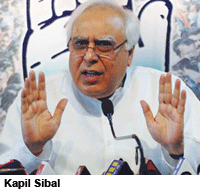Kapil Sibal’s ambitious education reforms agenda
 At a crowded press conference held in Shastri Bhavan, New Delhi on June 25, newly sworn-in human resources development minister Kapil Sibal outlined a heavy agenda for radical reform of India’s school and higher education systems. Excerpts:
At a crowded press conference held in Shastri Bhavan, New Delhi on June 25, newly sworn-in human resources development minister Kapil Sibal outlined a heavy agenda for radical reform of India’s school and higher education systems. Excerpts:
School Education
• Enactment of the Right of Children to Free and Compulsory Education Bill. Notification of the 86th Constitutional Amendment.
• Establishment of an All India Madarsa Board.
• Formulation of a policy framework for PPP (public-private partnerships) in school education.
• Expansion of broadband connectivity to increase use of ICT in secondary schools and open/distance schooling.
• Evolution of a National Curriculum Framework for teacher education.
• Explore accreditation body for schools.
• Examination reform in accordance with NCF 2005. This will include making the class X exam optional.
• Replacement of marks by grades system in CBSE schools.
• New National Literacy Mission focus on women.
• Madarsa/maktab modernisation and skills development for Muslim children.
Higher Education
Legislative initiatives
• Establish autonomous authority for higher education and research based on recommendations of the Yashpal Committee and National Knowledge Commission.
• Enact a law to prevent, prohibit and punish educational malpractice.
• Introduce legislation for mandatory assessment and accreditation in higher education through an independent regulatory authority.
• Enact a law to regulate entry and operation of foreign educational providers.
• Establish a fast-track tribunal for adjudication of disputes of stakeholders (teachers, students, employees and managements) in higher education.
• Amend the National Commission for Minority Education and Institutions Act to strengthen the commission.
Policy initiatives
• Formulate a ‘brain gain’ policy to attract talent to Indian institutions of higher education.
• Introduce new scheme of interest subsidy on educational loans availed by economically weak students.
• Strengthen and expand Scheme of Remedial Coaching of students from SC/ST minority communities in higher education.
• Establish equal opportunity offices in all universities.
• Formulate a new policy on distance learning.
• Regional centre/campus of the Indira Gandhi National Tribal University, Amarkantak to be established in Manipur.
• Promote model degree colleges in 100 districts with significant population of weaker sections and minorities.
• Establish 100 women’s hostels in higher educational institutions sited in districts with significant population of weaker sections and minorities.
Administrative/other initiatives
• Review functioning of deemed universities
• Operationalise newly-established 12 Central universities and two new IITs.
• Academic reforms (semester system, choice-based credit system, regular revision of syllabi, impetus to research etc — already mandated under the Central Universities Act, 2009) to be introduced in all Central educational institutions.
• Modernisation of copyright offices.
• 5,000 colleges/university departments to be equipped with broadband internet connectivity under the National Mission on Education through ICT programme.
• Provision of assistance to states for the establishment of 100 new polytechnics in unserved districts. States will be assisted in the construction of 100 women’s hostels in existing polytechnics.
• Establish 10 new NITs in the unserved states.
• Operationalise 700 revamped community polytechnics for skills development of rural youth.
• Direct credit of scholarship amounts into bank accounts of 41,000 boys and 41,000 girls every year, under the new Merit Scholarship Scheme for students in universities and colleges.














Add comment